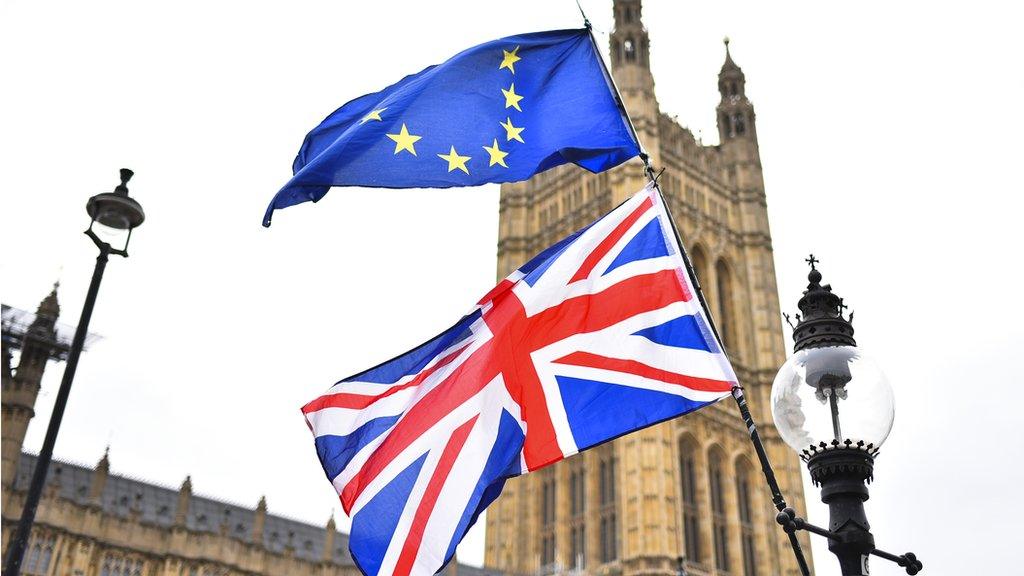No-deal Brexit: Can Parliament stop it?
- Published

There's a big problem facing members of Parliament who want to avoid a no-deal Brexit. They can't just show there is a majority in the House of Commons against no deal - they need to prove there is a majority in favour of an alternative outcome.
That's because leaving the EU - with or without a deal - is currently the default.
If the prime minister fails to get a deal through the House of Commons, the UK will leave with no deal at all unless something changes, because leaving the EU is written into UK law.
The EU Withdrawal Act sets 29 March as the date of departure.
The wording of the act does allow a minister to change the definition of "exit day" relatively quickly using a statutory instrument - a piece of secondary legislation - rather than an entirely new act of Parliament that would need to be debated. A minister would have to propose the change and MPs would have to approve it.
Article 50
But there is a second and more significant reason why no deal would become the default position: that's what EU law says.
Article 50 of the Lisbon Treaty is the formal route for any country leaving the EU and it allows for a two-year process of negotiation. At the end of that period "the treaties shall cease to apply to the state in question" unless Article 50 is extended or revoked.
The most obvious way therefore to stop a no-deal Brexit, or any form of Brexit, is to revoke Article 50.
The European Court of Justice has ruled the UK can do that on its own, without asking the other 27 countries, and stay a member of the EU on its current terms - including opting-out of key policies, and keeping the budget rebate.
But it seems highly unlikely that the House of Commons would vote to revoke Article 50 unless there had been another referendum, or maybe an election, in which the public backed the UK remaining in the EU.
The government rejects the idea of holding another referendum anyway - and the time to do so before the end of March has run out.
Extending Article 50
So, the other way to avoid a no-deal Brexit in the short term is to play for time and extend the Article 50 period. The government would need to propose that and MPs would have to approve it.
But, crucially, unlike in the case of revoking Article 50, to extend it the UK would also need the agreement of all 27 other EU countries.
It would probably need to persuade them that something important had changed in UK politics to warrant an extension - perhaps a looming election, or another referendum, rather than more of the same argument.
One of the constraints for the rest of the EU is that European elections will take place at the end of May and the new European Parliament (without UK MEPs if Brexit has taken place) is due to meet for the first time in July.
The only other circumstance in which a brief extension to Article 50 would probably be approved by the EU is if there had been a vote in favour of Theresa May's deal but a little more time was needed to dot the "i"s and cross the "t"s.
But if Article 50 was extended without a deal passing the House of Commons, no deal would still remain the default outcome at the end of the extended negotiating period.
So what else can MPs do for now?
In a word, amendments.
An amendment to the Finance Bill, limiting the Treasury's ability to make no-deal preparations unless authorised by Parliament, was backed by MPs by 303 to 296 votes.
This amendment will make it "harder for the government to drift into no deal without Parliament being able to direct it", according to Labour MP Yvette Cooper.
A cross-party coalition of MPs against no deal is now flexing its muscles, and what we're likely to see over the next couple of months is what some are calling "guerrilla warfare by amendment" in the House of Commons.

Yvette Cooper says her amendment has support from Remain and Leave MPs
The trade bill is likely to be another target - it would be needed in the event of no deal, to try to keep the UK trading on the same terms as it has now with the rest of the world.
The idea behind all this parliamentary manoeuvring is to demonstrate that there is a clear majority in the House of Commons against no deal.
But none of it, taken in isolation, will prevent the Article 50 clock ticking away until it stops at the end of March.
'Indicative votes'
That's why a growing number of MPs support the idea of holding a series of "indicative votes" on different potential outcomes, to try to find an alternative to no deal that would enjoy broad (or even sufficient) support.
Senior MPs argue that the government would be unable to ignore the political pressure if the will of the House of Commons was clearly expressed on numerous occasions. But political pressure is not the same as legal reality.
Three ministers have said publicly they would resign if the government pursued a no-deal strategy, while others are thought to hold the same position in private. A handful of backbench MPs have said they would quit the party.
The Work and Pensions Secretary, Amber Rudd, is understood to have told cabinet that history would take a dim view of the government if it accepted no deal and it would leave the UK a less safe country.
But if the prime minister did decide to press on regardless, it may well be that the only way MPs could stop a no-deal Brexit at the last moment would be to vote down the government itself.
UPDATE - This article was updated on Wednesday 9 Jan to include the new amendment asking government to return to Parliament with new plans within three days of a vote against the Prime Minister's withdrawal deal.


